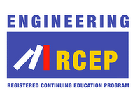
Registered Continuing Education Program
The Registered Continuing Education Program (RCEP) is a nationwide portal for professional development education and record-keeping. Continuing education providers and education seekers (engineers, surveyors, and related Architecture/Engineering/Construction (A/E/C) industry professionals) can tap into a single, comprehensive, and convenient education management system. https://redirect.aecdaily.com/s18122/www.rcep.net
Displaying 576 - 582 of 582 results.
FIRST PREV [476-500] [501-525] [526-550] [551-575] [576-582] LAST

 Rainscreen systems are designed to prevent moisture from infiltrating walls and weakening their structural integrity. Multicomponent backup wall systems have traditionally been used for commercial projects but have drawbacks ranging from creating plenty of waste to producing design challenges. The alternative of insulated metal panel barrier wall systems offers many advantages that are discussed in this course, including economic and environmental benefits, easier installation, and a fresh, modern look.
Rainscreen systems are designed to prevent moisture from infiltrating walls and weakening their structural integrity. Multicomponent backup wall systems have traditionally been used for commercial projects but have drawbacks ranging from creating plenty of waste to producing design challenges. The alternative of insulated metal panel barrier wall systems offers many advantages that are discussed in this course, including economic and environmental benefits, easier installation, and a fresh, modern look.

https://redirect.aecdaily.com/s18795/www.aecdaily.com/course/950624
This course contains sustainable design information. See the course details page for more information.
This course is ONLINE: SELF-PACED. Experience it on your own schedule, at your convenience.

 In the fight against climate change, efforts intensify against the planet’s number one enemy—carbon dioxide. The building industry will play a significant role in these efforts. Embodied carbon—the global greenhouse gas emissions generated from sourcing raw material and processing, manufacturing, transporting, and installing building materials—will be the target over the next decade. This course will define embodied carbon, its impact on greenhouse gas emissions, the construction industry's impact, and the methods and tools that building designers can employ to limit embodied carbon.
In the fight against climate change, efforts intensify against the planet’s number one enemy—carbon dioxide. The building industry will play a significant role in these efforts. Embodied carbon—the global greenhouse gas emissions generated from sourcing raw material and processing, manufacturing, transporting, and installing building materials—will be the target over the next decade. This course will define embodied carbon, its impact on greenhouse gas emissions, the construction industry's impact, and the methods and tools that building designers can employ to limit embodied carbon.

https://redirect.aecdaily.com/s9727/www.aecdaily.com/course/973831
This course contains sustainable design information. See the course details page for more information.
This course is ONLINE: SELF-PACED. Experience it on your own schedule, at your convenience.

 Energy conservation and occupant well-being, comfort, and productivity are issues of increasing concern in building design. This course illustrates how radiant heating and cooling systems address these issues positively and efficiently. It encompasses the various types of systems available and how they can contribute to credit requirements in the LEED® v4.1 Building Design and Construction rating system and the WELL Building Standard™ version 2. System workings, design, aesthetic considerations, advantages, testing and measuring protocols, and installation procedures are reviewed, and the course concludes with several installation examples.
Energy conservation and occupant well-being, comfort, and productivity are issues of increasing concern in building design. This course illustrates how radiant heating and cooling systems address these issues positively and efficiently. It encompasses the various types of systems available and how they can contribute to credit requirements in the LEED® v4.1 Building Design and Construction rating system and the WELL Building Standard™ version 2. System workings, design, aesthetic considerations, advantages, testing and measuring protocols, and installation procedures are reviewed, and the course concludes with several installation examples.

https://redirect.aecdaily.com/s1078698/www.aecdaily.com/course/1097505
This course contains sustainable design information. See the course details page for more information.
This course is ONLINE: SELF-PACED. Experience it on your own schedule, at your convenience.

 Insulated metal wall panels (IMPs) offer a sleek, modern, and light-weight envelope system that is highly customizable. This course explores the characteristics of IMPs, including how they can offer a five-in-one design solution that provides the exterior finish, as well as the air, vapor, water, and thermal control layers. Discussions will also include design options, installation processes, code compliance, sustainability, and available warranties.
Insulated metal wall panels (IMPs) offer a sleek, modern, and light-weight envelope system that is highly customizable. This course explores the characteristics of IMPs, including how they can offer a five-in-one design solution that provides the exterior finish, as well as the air, vapor, water, and thermal control layers. Discussions will also include design options, installation processes, code compliance, sustainability, and available warranties.

https://redirect.aecdaily.com/s18795/www.aecdaily.com/course/834059
This course contains sustainable design information. See the course details page for more information.
This course is ONLINE: SELF-PACED. Experience it on your own schedule, at your convenience.

 Cooktops are manufactured and classified by construction type and method of heat energy transfer. This course reviews the operation, control, performance, and efficiency of induction cooktops in comparison to their gas and electric counterparts, and shows how induction cooktops can be incorporated into any kitchen design in residential and specialty-commercial applications such as marine, mobile, military, academic, institutional, and hospitality.
Cooktops are manufactured and classified by construction type and method of heat energy transfer. This course reviews the operation, control, performance, and efficiency of induction cooktops in comparison to their gas and electric counterparts, and shows how induction cooktops can be incorporated into any kitchen design in residential and specialty-commercial applications such as marine, mobile, military, academic, institutional, and hospitality.

https://redirect.aecdaily.com/s655668/www.aecdaily.com/course/1036959
This course contains sustainable design information. See the course details page for more information.
This course is part of one or more "Course Collections". Click here to view the details.
This course is ONLINE: SELF-PACED. Experience it on your own schedule, at your convenience.

 As some of the earliest building materials, masonry and concrete have been used for their durability and strength. However, masonry architecture, both historical and contemporary, has been left vulnerable to water—the single most damaging element to masonry in our environment. This course identifies common water-related problems for masonry and concrete, describes protective treatments that increase masonry durability, and explains the process for safely selecting and applying a protective treatment.
As some of the earliest building materials, masonry and concrete have been used for their durability and strength. However, masonry architecture, both historical and contemporary, has been left vulnerable to water—the single most damaging element to masonry in our environment. This course identifies common water-related problems for masonry and concrete, describes protective treatments that increase masonry durability, and explains the process for safely selecting and applying a protective treatment.

https://redirect.aecdaily.com/s10541/www.aecdaily.com/course/895029
This course contains sustainable design information. See the course details page for more information.
This course is ONLINE: SELF-PACED. Experience it on your own schedule, at your convenience.

 Synthetic roofing materials have been available in the market for more than a decade, providing a cost-effective, viable alternative to traditional slate and shake roofing systems. This course provides an overview of the features and benefits of slate and shake synthetic roofing products, including a discussion on the testing methods used to rate specific performance characteristics.
Synthetic roofing materials have been available in the market for more than a decade, providing a cost-effective, viable alternative to traditional slate and shake roofing systems. This course provides an overview of the features and benefits of slate and shake synthetic roofing products, including a discussion on the testing methods used to rate specific performance characteristics.

https://redirect.aecdaily.com/s424571/www.aecdaily.com/course/899116
This course contains sustainable design information. See the course details page for more information.
This course is ONLINE: SELF-PACED. Experience it on your own schedule, at your convenience.

 Building owners value daylighting and views but face security and safety challenges with large amounts of glazing. Thermoplastic sheet products offer a variety of glazing solutions that resist security threats while providing transparency, strength, and durability. This course introduces the grades and characteristics of acrylic and polycarbonate sheet products and discusses how they meet the requirements for protection against forced entry and ballistics.
Building owners value daylighting and views but face security and safety challenges with large amounts of glazing. Thermoplastic sheet products offer a variety of glazing solutions that resist security threats while providing transparency, strength, and durability. This course introduces the grades and characteristics of acrylic and polycarbonate sheet products and discusses how they meet the requirements for protection against forced entry and ballistics.

https://redirect.aecdaily.com/s5057/www.aecdaily.com/course/888587
This course contains sustainable design information. See the course details page for more information.
This course is part of one or more "Course Collections". Click here to view the details.
This course is ONLINE: SELF-PACED. Experience it on your own schedule, at your convenience.